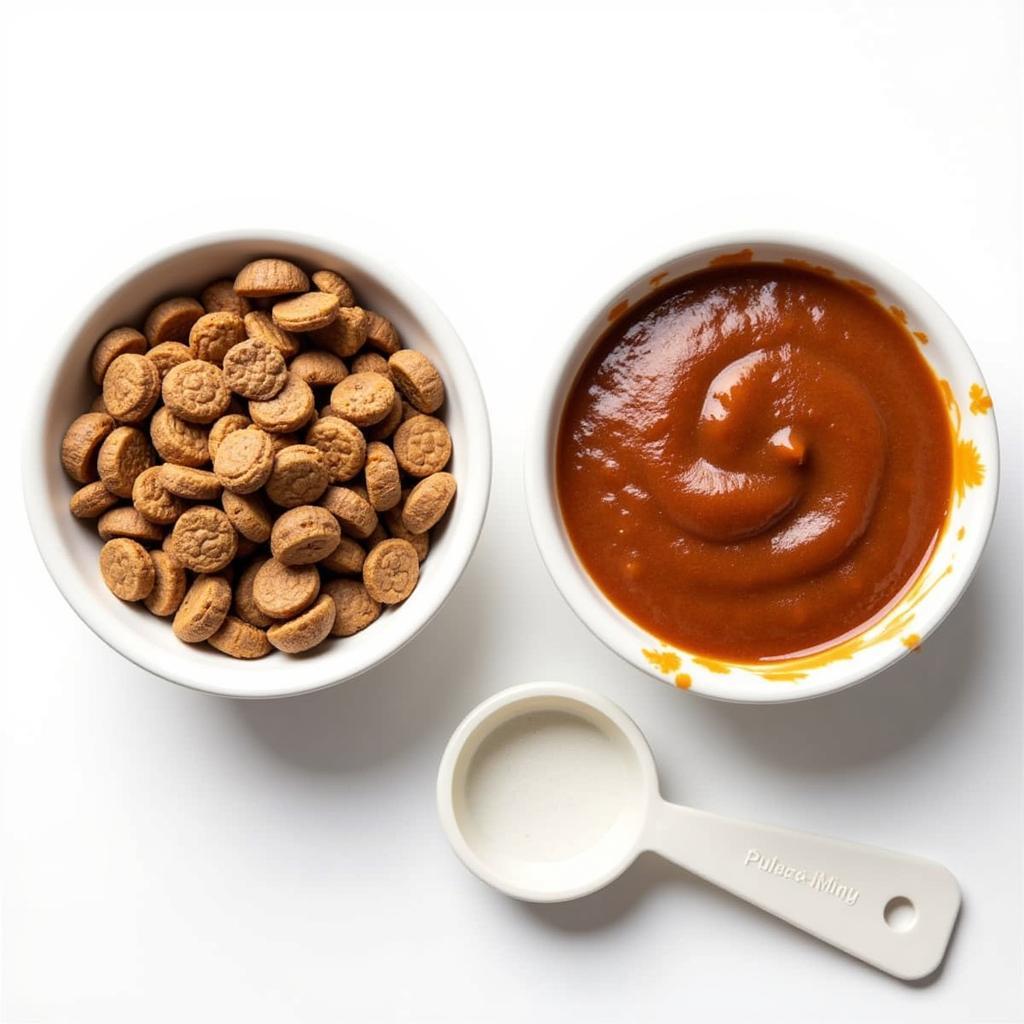Choosing the Best Food For Westie Puppies is crucial for their growth and development. From the moment you bring your adorable West Highland White Terrier puppy home, their nutritional needs are paramount. A well-balanced diet will set them up for a long, healthy, and happy life, free from common Westie health issues. This guide explores the essential aspects of Westie puppy nutrition, helping you make informed choices to ensure your furry friend thrives.
What Makes Westie Puppies Unique?
West Highland White Terriers, with their playful personalities and striking white coats, have specific dietary requirements that differ from other breeds. Their predisposition to skin allergies means that choosing the right food is even more important. A poor diet can exacerbate these allergies, leading to itching, discomfort, and even infections. Understanding these unique needs will help you select the best food for your Westie puppy.
Addressing Common Westie Health Concerns with Diet
Westies are prone to certain health issues, including skin allergies, atopic dermatitis, and food sensitivities. While genetics play a role, a balanced diet can significantly impact these conditions. Look for food formulated to support skin and coat health, often containing omega-3 fatty acids and other beneficial ingredients.
Key Nutrients for Westie Puppy Growth
During their first year, Westie puppies experience rapid growth and development, requiring a diet rich in specific nutrients. Protein is essential for building and repairing tissues, while calcium and phosphorus support strong bones and teeth. Essential fatty acids, like omega-3s and omega-6s, contribute to healthy skin and a shiny coat.
Protein Powerhouse: Fueling Westie Puppy Muscles
Protein is the building block of muscles, and for active Westie puppies, a high-quality protein source is essential. Look for puppy food that lists a named meat source, such as chicken, lamb, or fish, as the primary ingredient. Avoid generic terms like “meat by-products” as these can indicate lower-quality ingredients.
Calcium and Phosphorus: Building Strong Bones
Calcium and phosphorus are crucial for healthy bone development in Westie puppies. The correct ratio of these minerals is essential to prevent skeletal problems later in life. Most high-quality puppy foods are formulated with the appropriate balance of calcium and phosphorus.
Choosing the Right Type of Puppy Food
With so many puppy food options available, choosing the best one can feel overwhelming. From kibble to wet food, and even raw diets, each type has its pros and cons. Consider your puppy’s preferences and any specific dietary needs when making your selection.
Kibble vs. Wet Food: Which is Best?
Kibble is convenient and cost-effective, while wet food often contains higher moisture content, which can be beneficial for puppies prone to urinary tract infections. Many Westie owners opt for a combination of both to provide variety and ensure adequate hydration.
 Comparison of Kibble and Wet Puppy Food
Comparison of Kibble and Wet Puppy Food
Raw Diets: A Controversial Choice
Raw diets have gained popularity, but they come with potential risks, including bacterial contamination and nutritional imbalances. If you’re considering a raw diet for your Westie puppy, consult with a veterinarian specializing in canine nutrition to ensure it meets their specific needs.
Avoiding Common Food Allergens in Westies
Westies are particularly susceptible to food allergies. Common culprits include beef, wheat, corn, and soy. Opt for limited-ingredient diets or hypoallergenic formulas to minimize the risk of allergic reactions.
Reading Food Labels: Deciphering the Ingredients
Understanding food labels is key to choosing the best food for your Westie puppy. Look for clear ingredient lists with recognizable whole foods. Avoid artificial colors, flavors, and preservatives, which can trigger allergies or other health issues.
Conclusion
Choosing the best food for westie puppies involves careful consideration of their unique needs, potential health concerns, and nutritional requirements. By focusing on high-quality ingredients, avoiding common allergens, and consulting with your veterinarian, you can ensure your Westie puppy receives the optimal nutrition for a long, healthy, and happy life.
FAQ
- What is the best age to switch a Westie puppy to adult food? Around 12 months.
- How often should I feed my Westie puppy? 3-4 times a day for young puppies, transitioning to twice a day as they grow.
- Can I give my Westie puppy treats? Yes, but in moderation and choose healthy, puppy-appropriate treats.
- What are signs of a food allergy in a Westie puppy? Itching, skin redness, ear infections, and digestive upset.
- Should I supplement my Westie puppy’s diet? Generally not necessary with a complete and balanced puppy food, but consult your vet.
- What is the ideal weight for a Westie puppy? It varies depending on age, but consult a growth chart for guidance.
- How can I encourage my Westie puppy to eat? Try different food textures or slightly warming the food.
For further assistance, please contact us at Phone Number: 02437655121, Email: minacones@gmail.com Or visit our address: 3PGH+8R9, ĐT70A, thôn Trung, Bắc Từ Liêm, Hà Nội, Việt Nam. We have a 24/7 customer service team.